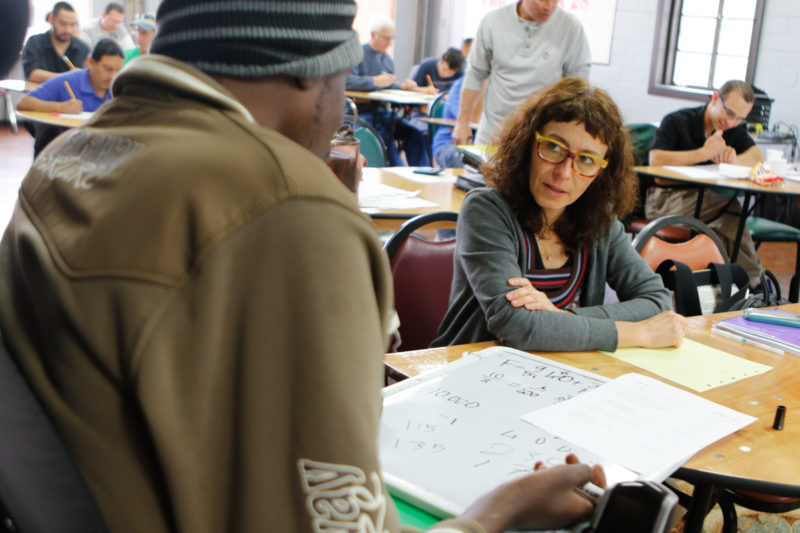San Antonio Group Tackles Adult Literacy, One Student at a Time
By Kaulie Lewis
Reporting Texas

Idris Ahmad, 33, from Sudan works through math problems with volunteer tutor Cinzia Pellegrino, 43, at Each One Teach One. Ahmad has been working towards getting his GED so he can attend college. Denise Cathey/Reporting Texas.
When Arthur Montalbo was working in Galveston, he never found the time to take his high-school equivalency test. He had a family to support, and that came first. The one time he applied for a continuing education program, it turned out to be a scam, leaving him thousands of dollars in debt and no closer to his dream of working in computer maintenance.
Years later, his daughter brought him to San Antonio and encouraged him to pursue his GED. Now he spends his Wednesday afternoons at the Each One Teach One headquarters, going over algebraic equations with a tutor in preparation for the test.
“I’ve had some rough times before, but they really help you out here,” he says.
Each One Teach One, the organization behind Montalbo’s GED prep, is the only adult literacy education nonprofit serving the greater San Antonio area. Though San Antonio is the seventh largest city in the United States, it ranks 73rd in national measures of literacy according to U.S. Census data and a report from Central Connecticut State University. Roughly one in four San Antonio adults is functionally illiterate, defined as reading at or below the fifth-grade level.
“The need is just horrendous,” said Carolyn Heath, the founder and director of Each One Teach One. “And it’s not just San Antonio; it’s Texas.” Now her organization is doing all it can to help.
Heath began Each One Teach One in 2004 after she noticed adults at a tax preparation site struggling to fill out their intake forms. Soon, students were coming from across the city and its suburbs. “We learned that we had just stumbled on one of the most serious issues facing our city.”

Founder and Executive Director Carolyn Heath has run Each One Teach One San Antonio program since 2004. Denise Cathey/Reporting Texas
Though Heath may not have intended the nonprofit to become the face of adult literacy education in San Antonio, she emphasizes the importance of the services her organization offers.
“Domestic violence, homelessness, substance abuse,” she said. “Take any social issue that you can think of, really, and those at the lowest educational rungs are disproportionately affected.”
The numbers support her: 43 percent of adults with the lowest measure of literacy live in poverty, according to the National Assessment of Adult Literacy, and 85 percent of juveniles in the court system are functionally illiterate.
But for students at Each One Teach One, adult education offers a way forward through flexible and individual tutoring. The program served 354 students in 2016 and is on track to reach over 500 this year, a feat only made possible by the help of more than 100 tutors who volunteer their time to meet with students.
The organization also is expanding through partnerships with local businesses such as H-E-B to provide literacy training on job sites. That program, sponsored by the Texas Workforce Commission, is gaining traction among San Antonio employers, who Heath says often are more than happy to offer educational services to employees in a job market desperate for educated workers.
Such partnerships are part of a larger shift in the way Texas approaches adult literacy. The state’s Adult Education and Literacy agency has moved to the Texas Workforce Commission in an effort to better link literacy efforts with workforce training resources, said Katrina Anaya, the program director at statewide literacy coalition Literacy Texas.
“Since [the AEL] moved, there’s been this emphasis on literacy to be able to get a job, and I think that makes sense,” she explains. “It’s not just about being able to read a book; it’s about being able to read an application or write a resume or address basic health needs, all these other things.”
Each One Teach One takes “all these other things” into consideration as well, measuring learner success with education-oriented progress tests while also watching for broader changes in learners’ personal lives.
Sometimes it’s as simple as “seeing people go from being very hesitant to express themselves to just having a bigger bank of words, and because they know more words, they talk more,” Heath explained.
One student who was homeless when he entered the program now has an apartment; his academic performance continues to improve as he works towards his high school equivalency, and he’s joined Each One Teach One’s team of “learner leaders.”
That kind of progress really embodies what Heath’s organization is ultimately working to accomplish, she said.

Mayra Arevalo, 26, ponders an ESL word problem about schedules and time during her tutoring session at Each One Teach One San Antonio. Arevalo moved to San Antonio from Guadalajara, Mexico ,and plans to learn English so she can obtain the U.S. equivalent of her accounting degree from Mexico.
But when working with any learner, Heath makes sure to emphasize, “the only difference between you and me is an education. It’s not like there’s some magical thing going on here. It’s just education.”